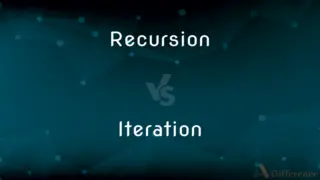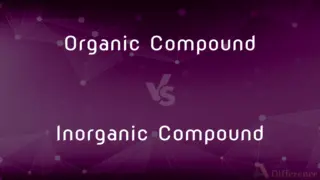Increment vs. Increase — What's the Difference?
By Fiza Rafique & Maham Liaqat — Updated on March 15, 2024
Increment refers to a specific, often fixed, amount or degree by which something is made larger or more. Increase, however, denotes a more general rise or growth in size, amount, number, or intensity without specifying the rate or amount.

Difference Between Increment and Increase
Table of Contents
ADVERTISEMENT
Key Differences
Increment is typically used in contexts where the growth or addition is regular, quantifiable, and often predetermined, such as in salaries, where employees might receive an annual increment. This term implies a discrete, step-like enhancement where the amount or degree of each step is usually known or established in advance. Increase, on the other hand, covers a broader range of growth or expansion possibilities and is not limited to specific or fixed amounts. It can refer to any rise in quantity, size, intensity, or extent and can occur in varying degrees and over different periods.
While an increment is a type of increase, it is more specific and structured. The use of "increment" over "increase" often implies a more systematic, orderly, or controlled form of growth. In contrast, "increase" is more versatile and can describe any form of growth, whether it's gradual, rapid, consistent, or irregular.
In financial contexts, an increment might refer to a specific, scheduled raise in pay or investment value, reflecting a structured approach to growth. An increase in this context would denote any rise in value or returns, which could be due to a range of factors and might not follow a predictable pattern.
Both terms denote a form of growth or addition, while "increment" is more precise and structured, often used in technical, financial, or formal contexts to imply a methodical increase. "Increase" is more general and flexible, suitable for a wide array of contexts where something becomes greater in size, amount, number, or degree.
Comparison Chart
Definition
A specific, often fixed, amount or degree by which something is made larger or more.
A general rise or growth in size, amount, number, or intensity.
ADVERTISEMENT
Implication
Implies regularity, quantifiability, and often a predetermined rate or amount.
Covers a broad range of growth possibilities without specifying rate or amount.
Usage Context
Common in technical, financial, or structured contexts.
Versatile, used across a wide array of contexts.
Type of Growth
Discrete and step-like, with known or established intervals.
Can be gradual or sudden, large or small, without fixed intervals.
Example
Annual salary increments, incrementing a value in programming.
Increase in temperature, population growth.
Compare with Definitions
Increment
A specific amount by which something increases.
Employees received a 5% salary increment this year.
Increase
A rise in quantity, size, or intensity.
There was a significant increase in demand for the product.
Increment
A discrete step or level in a series.
The software's volume control adjusts in small increments.
Increase
A growth in number or extent.
The company has seen an increase in employees over the past year.
Increment
A scheduled raise in value or pay.
The annual increment in the investment plan is 4%.
Increase
An expansion in scope or range.
The project's scope has seen a gradual increase.
Increment
An addition of a fixed amount.
The loop counter increments by 1 with each iteration.
Increase
A boost in level or degree.
The new policy led to an increase in customer satisfaction.
Increment
A precise adjustment in quantity or size.
The machine's precision allows for increments as small as 0.01 millimeters.
Increase
An augmentation in value or quality.
Improvements in technology contribute to an increase in overall efficiency.
Increment
The process of increasing in number, size, quantity, or extent.
Increase
To become greater or larger.
Increment
Something added or gained
A force swelled by increments from allied armies.
Increase
To multiply; reproduce.
Increment
A slight, often barely perceptible augmentation.
Increase
To make greater or larger.
Increment
One of a series of regular additions or contributions
Accumulating a fund by increments.
Increase
The act of increasing
A steady increase in temperature.
Increment
(Mathematics) A small positive or negative change in the value of a variable.
Increase
The amount or rate by which something is increased
A tax increase of 15 percent.
Increment
The action of increasing or becoming greater.
Increase
(Obsolete) Reproduction and spread; propagation.
Increment
(heraldry) The waxing of the moon.
Increase
(intransitive) (of a quantity, etc.) To become larger or greater.
His rage only increased when I told him of the lost money.
Increment
The amount of increase.
Increase
(transitive) To make (a quantity, etc.) larger.
Increment
(rhetoric) An amplification without strict climax, as in the following passage: "Finally, brethren, whatsoever things are true, whatsoever things are honest, whatsoever things are just, whatsoever things are pure, whatsoever things are lovely, whatsoever things are of good report, {{...}} think on these things."
Increase
To multiply by the production of young; to be fertile, fruitful, or prolific.
Increment
(chess) The amount of time added to a player's clock after each move.
Increase
To become more nearly full; to show more of the surface; to wax.
The Moon increases.
Increment
(grammar) A syllable in excess of the number of the nominative singular or the second-person singular present indicative.
Increase
An amount by which a quantity is increased.
Increment
To increase by steps or by a step, especially by one.
Increase
For a quantity, the act or process of becoming larger
Increment
The act or process of increasing; growth in bulk, guantity, number, value, or amount; augmentation; enlargement.
The seminary that furnisheth matter for the formation and increment of animal and vegetable bodies.
A nation, to be great, ought to be compressed in its increment by nations more civilized than itself.
Increase
Offspring, progeny
Increment
Matter added; increase; produce; production; - opposed to decrement.
Increase
(knitting) The creation of one or more new stitches; see Increase (knitting).
Increment
The increase of a variable quantity or fraction from its present value to its next ascending value; the finite quantity, generally variable, by which a variable quantity is increased.
Increase
To become greater or more in size, quantity, number, degree, value, intensity, power, authority, reputation, wealth; to grow; to augment; to advance; - opposed to decrease.
The waters increased and bare up the ark.
He must increase, but I must decrease.
The heavens forbidBut that our loves and comforts should increase,Even as our days do grow!
Increment
An amplification without strict climax, as in the following passage:
Finally, brethren, whatsoever things are true, whatsoever things are honest, whatsoever things are just, whatsoever things are pure, whatsoever things are lovely, whatsoever things are of good report, . . . think on these things.
Increase
To multiply by the production of young; to be fertile, fruitful, or prolific.
Fishes are more numerous or increasing than beasts or birds, as appears by their numerous spawn.
Increment
A process of becoming larger or longer or more numerous or more important;
The increase in unemployment
The growth of population
Increase
To become more nearly full; to show more of the surface; to wax; as, the moon increases.
Increment
The amount by which something increases;
They proposed an increase of 15 percent in the fare
Increase
To augment or make greater in bulk, quantity, extent, value, or amount, etc.; to add to; to extend; to lengthen; to enhance; to aggravate; as, to increase one's possessions, influence.
I will increase the famine.
Make denialsIncrease your services.
Increase
Addition or enlargement in size, extent, quantity, number, intensity, value, substance, etc.; augmentation; growth.
As if increase of appetite had grownBy what it fed on.
For things of tender kind for pleasure madeShoot up with swift increase, and sudden are decay'd.
Increase
That which is added to the original stock by augmentation or growth; produce; profit; interest.
Take thou no usury of him, or increase.
Let them not live to taste this land's increase.
Increase
Progeny; issue; offspring.
All the increase of thy house shall die in the flower of their age.
Increase
Generation.
Increase
The period of increasing light, or luminous phase; the waxing; - said of the moon.
Seeds, hair, nails, hedges, and herbs will grow soonest if set or cut in the increase of the moon.
Increase
A quantity that is added;
There was an addition to property taxes this year
They recorded the cattle's gain in weight over a period of weeks
Increase
A change resulting in an increase;
The increase is scheduled for next month
Increase
A process of becoming larger or longer or more numerous or more important;
The increase in unemployment
The growth of population
Increase
The amount by which something increases;
They proposed an increase of 15 percent in the fare
Increase
The act of increasing something;
He gave me an increase in salary
Increase
Become bigger or greater in amount;
The amount of work increased
Increase
Make bigger or more;
The boss finally increased her salary
The university increased the number of students it admitted
Common Curiosities
What is an increment?
An increment is a specific, often fixed, amount or degree by which something is made larger or more, typically implying regularity and precision.
Can an increment be considered an increase?
Yes, an increment is a form of increase, but it is more specific and often involves a fixed or predetermined amount.
How is increment used in programming?
In programming, incrementing typically means adding a fixed amount (often 1) to a variable's value, reflecting a precise and controlled adjustment.
Is every increase an increment?
Not every increase is an increment because increases can vary in size and regularity, while increments are specific and often fixed.
Can salaries have both increments and increases?
Yes, salaries can have increments in the form of structured raises and general increases that may result from promotions or other adjustments.
Is an increment always a positive change?
While typically positive, implying growth, in some contexts, increments could refer to structured increases that might not be desirable, such as in debt.
How does an increase in skills impact career development?
An increase in skills can significantly enhance career development, leading to more opportunities, higher positions, and potentially greater income.
Can environmental factors cause increments in data measurements?
Environmental factors can cause increments in data measurements if they lead to regular, quantifiable changes, such as seasonal temperature adjustments.
How does an increase differ from an increment?
An increase refers to a general rise or growth in size, amount, number, or intensity, without the specificity or structured nature of an increment.
How can businesses plan for increments and increases?
Businesses can plan for increments by budgeting for structured raises or costs, while planning for increases might involve more flexible strategies to accommodate variable changes.
How do increments work in financial investments?
In financial investments, increments usually refer to scheduled or fixed increases in value, such as interest accrual at a set rate.
What might cause a general increase in a market?
Factors like rising demand, limited supply, or external economic conditions can cause a general increase in market prices or value.
What role do increments play in goal-setting?
Increments can serve as milestones or checkpoints in goal-setting, providing clear, measurable steps towards achieving a larger objective.
What is the psychological effect of regular increments in rewards?
Regular increments in rewards can boost motivation and satisfaction by providing tangible evidence of progress and achievement.
How do increments and increases affect budgeting and financial planning?
Increments allow for precise budgeting due to their predictability, while increases require more flexible planning to accommodate variable growth rates.
Share Your Discovery

Previous Comparison
Mountain vs. Peak
Next Comparison
Wyvern vs. DrakeAuthor Spotlight
Written by
Fiza RafiqueFiza Rafique is a skilled content writer at AskDifference.com, where she meticulously refines and enhances written pieces. Drawing from her vast editorial expertise, Fiza ensures clarity, accuracy, and precision in every article. Passionate about language, she continually seeks to elevate the quality of content for readers worldwide.
Co-written by
Maham Liaqat















































